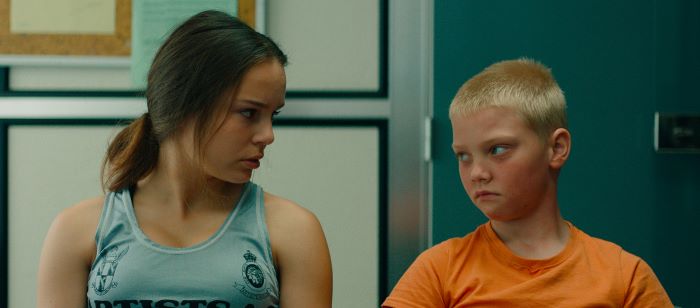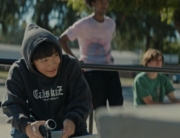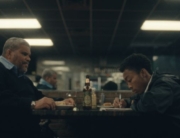Solidly directed and well-acted, The Worst Ones tells a story of exploitation, privilege, and the artist’s creative impulse. At times, it’s like watching a satire, a work of social realism, or a feel-good drama.
In a long opening sequence, a documentarian interviews a group of young kids in a rough neighborhood in a northern French suburb, or that’s what it seems at first. It turns out they are auditioning to be in director Gabriel’s first feature film, his passion project. To the film’s credit, Gabriel (Johan Heldenbergh) doesn’t come off as completely clueless and arrogant filmmaker, though he isn’t fully in control. Though compassionate and driven, he sometimes pushes the young actors’ buttons to get what he wants, questionably putting them in physical and emotional danger to get the results he wants for his film.
The Worst Ones focuses particularly on two locals cast in Gabriel’s film and their home life: Lily (Mallory Wanecque), a vibrant, wise beyond her years 16-year-old with a bad reputation; and Ryan (Timéo Mahaut), an odd little boy who has severe anger issues and is being raised by his sister. Both Wanecque and Mahaut are simply phenomenal. You rarely see such committed, honest performances in actors this young. They are absolute naturals in front of the camera and somehow harbor and plumb emotional depths naturally and simply. It is a joy to watch them.
Co-directors/co-writers Lise Akoka and Romane Gueret slowly unpeel their characters and circumstances. Turns out Lily has a younger brother who died of cancer, and her guilt and loss informs her decisions. Ryan lives with her sister because his mom is an abusive alcoholic. Much of the overall conflict comes from the expectations that come from the rules and mores of living in a rough neighborhood in comparison to the demands of working on a film set. These kids are feeling their way through both.
Aside from stellar performances, there is much to admire in The Worst Ones: a solid grasp of the inherent class conflict between the two worlds and the ability to convey that in subtle and sophisticated ways. Some individual scenes border on transcendence. A late night, pot-infused bull session between production assistant Judith (Esther Archambault) and Lily is lovely as is a beautiful scene between Ryan and his sister, Mélodie (a terrific Angélique Gernez), the only stable and loving presence in the boy’s life.
Eventually, the making of the Gabriel’s film offers the kids an outlet and an escape, and for Lily, the hope of a future where she is finally seen and accepted. In contrast, the neighbors mostly resent either the attention the kids cast in the film are getting or the portrayal of the neighborhood. (As one of the child actors points out, Gabriel has deliberately cast “the worst ones” among the kids.) In an example of how the film raises a conflict and then somewhat skirts it, Judith defends Gabriel’s film to a group of concerned residents who feel they are being exploited by the filmmakers. The confrontation becomes quickly resolved, with everyone having a beer and burying the hatchet. As a result, the film’s strengths lie within its individual parts, as opposed to one overarching sharp viewpoint, such as the scenes that slyly sendup art-house cinema or trace Lily’s growing confident, on and off the set.







Leave A Comment